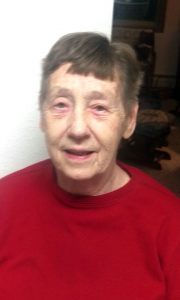Feeding an addiction, one slot at a time
- Jan 1, 2017
- 3 min read
Marcie Carper never imagined she would have a problem with gambling and would have almost certainly bet you that she would have been the last person to be addicted to gambling.
The 82-year-old resident of Little Falls is a widowed mother of five who has done a lot of living in her life — including gambling.

Marcie Carper, of Little Falls, struggled with a gambling addiction before receiving treatment and now works as a state approved gambling treatment provider through the Northstar Problem Gambling Alliance, a Roseville-based nonprofit that includes online resources and a hotline. Photo by Sandra Videen
“I was working up in Duluth at the time that I got caught up with the gambling,” said Carper, now a state-approved gambling treatment provider. “And I was working as a counselor for a displaced homemaker program, like social work, at the time of my addiction.”
For the past several years, Carper has been working with the Northstar Problem Gambling Alliance (NPGA), a Roseville-based nonprofit focusing on awareness, education, prevention and advocacy for treatment of problem gambling in Minnesota, which affects many seniors, she said.
“We’ve got a hotline number that you can call also,” she said of the Minnesota affiliate to the National Council on Problem Gambling. “The hotline directs people to help in the part of the state that they live in, and we also have an in-patient treatment program in Granite Falls.”
NPGA is a coalition of individuals and organizations “sharing the belief that problem gambling is a serious public health problem that is both treatable and preventable,” according to officials.
“The older people — when they’ve lost a loved one or if they don’t have anything to do anymore or don’t know what to do – they will find a casino quite exciting,” Carper said. “I’ve met several older people who have ‘hurt’ themselves by not having any money left except Social Security.”
She said of the impetus for NPGA’s creation more than three decades ago: “When they started putting up the casinos and some of the stuff opened up for gambling in Minnesota, they saw it had become a problem for some people, but there wasn’t any help for them at the time.”
According to NPGA’s website: “We work to raise public awareness about problem gambling and the stigma that’s often associated with it. We advocate for funding for treatment programs and provide professional training for those who work with problem gamblers.”
Carper’s participation in an outpatient treatment program in Duluth for her own gambling addiction is what got her interested in becoming involved with helping other seniors like herself.
“‘Why could I get caught up in a gambling disease? I am a fairly intelligent, older person, who graduated from college?’” she had asked of herself. “And it’s because it can happen to anybody.”
More than 120,000 people in Minnesota are affected by problem gambling, and the financial, emotional and social impact can be “devastating,” according to NPGA officials.
Carper’s gambling addition began with pull tabs offered at her local VFW, which was an escape from her worries at the time, and then she tried her luck gambling in a downtown Duluth casino.
“I went into debt with the credit cards a lot is what I did,” Carper said. “And instead of spending what I could afford to spend — like $5 at a time, once or twice a week — it increased, and I had to get my money from some place, and I could get it off credit cards, but I didn’t want to admit it.”
According to Northstar Problem Gambling Alliance’s website: “Early intervention is key, and we want people to know that there is no shame in admitting a gambling problem, and that help is available.”
“The program, itself, is not against gambling,” Carper said of the Northstar Problem Gambling Alliance and gambling addiction, which affects young and old alike for different reasons. “There is no way to tell exactly who is going to get caught in it and who is not going to get caught in it.”
A considerable portion of Northstar Problem Gambling Alliance’s funding comes from the state of Minnesota and from major corporate sponsorships from the Minnesota Lottery, Canterbury Park and the Mille Lacs Band of Ojibwe, according to NPGA’s website.
“There are more suicides committed from gambling addiction than there are from drugs and alcohol addiction,” said Carper, a former member of NPGA’s board of directors.
“If you call our hotline number, those people are trained to help you, so you won’t be in danger of hurting yourself or anybody else.”
For more information about the Northstar Problem Gambling Alliance, visit www.northstarproblemgambling.org, e-mail info@northstarproblemgambling.org or call 612-424-8595.




Comments